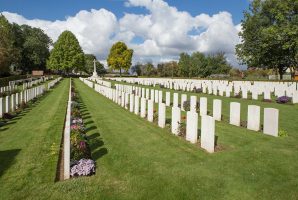In Flanders fields the poppies blow
Between the crosses, row on row,
That mark our place, and in the sky,
The larks, still bravely singing, fly,
Scarce heard amid the guns below.
We are the dead; short days ago
We lived, felt dawn, saw sunset glow,
Loved and were loved, and now we lie
In Flanders fields.
Take up our quarrel with the foe!
To you from failing hands we throw
The torch; be yours to hold it high!
If ye break faith with us who die
We shall not sleep, though poppies grow
In Flanders fields.
— Lt. Col. John McCrae
By Dennis Stacey – Publisher
Though my memory tells me I was younger than 10 when I first learned In Flanders Fields in school, I cannot actually recall how old I was, because it feels as though I’ve known this poem my whole life.
When I close my eyes, I can still hear my young self and my fellow classmates reciting the verses in our monotonic rhythm – the unavoidable byproduct of teaching kids far too young and innocent how to appreciate the weighty significance of the words they were learning.
Penned at back of field ambulance
Lieutenant-Colonel John McCrae was around my age now, when he penned what would become his most famous work.
Though many legends have circulated over the years about the origins of the poem, the most widely-accepted belief is that he wrote In Flanders Fields on May 3, 1915, a day after presiding over the funeral and burial of his friend, Lieutenant Alexis Helmer, who died during the second battle of Ypres, Belgium.

He penned it as he sat upon the back of a medical field ambulance near an advance dressing post at Essex Farm, just north of Ypres, where poppies grew in great numbers in the spoiled earth of battlefields and cemeteries of Flanders.
The legend says fellow soldiers retrieved the poem after McCrae, initially dissatisfied with his work, discarded it and In Flanders Fields was first published on Dec. 8 of that year in a London-based magazine.
Our focus was on simple parts
While learning the words in class, we made construction-paper poppies to display in our school’s classrooms and hallways for when the solemn-looking older men would visit the school and tell us we must “never forget”.
Our young minds focused on the visual imagery of poppies and crosses, singing birds and guns, while the intangible concept of death in the second verse eluded us. We lacked both emotional maturity and life experience to comprehend it at such a young age.
Rereading these words today – after having lived, loved, and experienced loss of my own – I can better understand and appreciate the magnitude of sorrow and helplessness that pained McCrae as he penned them.
We are the dead; short days ago we lived, felt dawn, saw sunset glow, loved and were loved…
Over 11 million military personnel and seven million civilians died in the four years of WWI. Another 20 million were injured.
Growing up as a kid in Canada, war was far removed from my reality, but the words of John McCrae stayed with me all these years. When I read, ‘If ye break faith with us who die, we shall not sleep…’ it gives me an uneasy pause as I see many of the past tragedies that led to countless deaths playing out over and over again around the world today.



